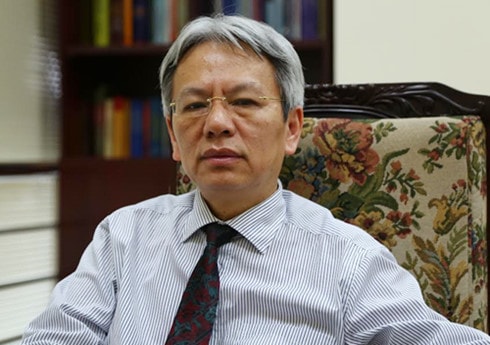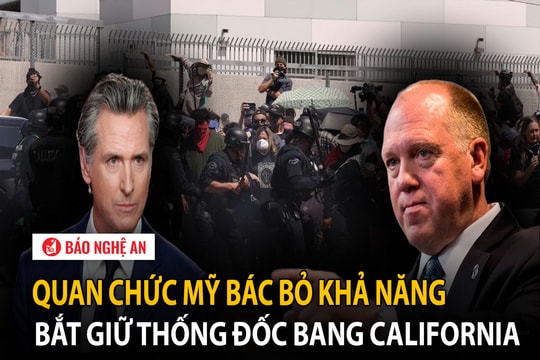Why are officials still not 'servants of the people'?
Dr. Nguyen Sy Dung believes that the incentive system to serve the people and become "public servants" has not been designed properly, so many people still consider themselves officials.
The important message given by Prime Minister Nguyen Xuan Phuc at the regular meeting in April, the first meeting since the Government was reorganized, was: We must shift from the administrative command method to a creative and developing Government, managing and doing public service work for the people, taking care of serving the people. Based on the Prime Minister's direction, experts believe that to do this, we must continue administrative reform, including being more drastic in streamlining the payroll.
Dr. Nguyen Sy Dung, former Deputy Head of the National Assembly Office, discussed this content.
PVSir, in administrative reform, the phrase “public servant” is often mentioned with the implication of building a team of civil servants to serve the people. But in reality, the concept of “official” is still popular. What do you think about this issue?
Dr. Nguyen Sy Dung: Yes, in fact, I said public servants, but public servants only have power, while the people have no say in the promotion and disciplinary process. As for the model of electing National Assembly and People's Council deputies, the people have the right to decide.
In civil service, only the superiors can promote. Therefore, the incentive system to serve the people and become public servants has not been designed properly, so many people still consider themselves officials.
 |
| Dr. Nguyen Sy Dung (Photo: VTC) |
PV:At the recent Government meeting, Prime Minister Nguyen Xuan Phuc gave very specific messages: Proactively focus more on institution building, strengthen management, maintain discipline, administrative order... In your opinion, how does the Prime Minister's determination to innovate affect the administration?
Dr. Nguyen Sy Dung: I think initial determination is very important. Because system innovation, especially innovation and reform of the administrative system, is a very difficult task, it affects the interests of the civil service system and perhaps of many other institutions in our society.
So without political will, we will obviously face difficulties and disapproval, which will also discourage us. Political will is a very important start.
PV:According to you, how should we change the concept from "civil servant" to "servant of the people"?
Dr. Nguyen Sy Dung: I think that we cannot change things by words, we mainly need to have institutional changes. For example, measuring people's satisfaction to promote and reward civil servants - that is a way of exercising power. Now, if we just listen to reports and then award medals and certificates of merit like this and that, it will be very difficult.
However, if we measure people's satisfaction, when people are 90% satisfied, it's different, when they are 95% satisfied, it's different. Obviously, the whole system is designed to make people satisfied. If we go further, we have to consider bigger electoral reforms. I think there must be an appropriate step.
For example, the Central Party has approved the election of the Commune Chairman, but we have not done it yet. If we elect the Commune Chairman, we will see that the administrative agency at the grassroots level must immediately depend on the people. If you design immediate dependence on the people, you will immediately switch to serving.
You keep saying you are a leader, a manager, and keep causing difficulties, so how can people vote for you next time? Between a person who says “I will serve” and a person who says “I will manage”, who will people vote for? So, if we have institutional reforms, we will definitely make a change.
PV: Speaking specifically about streamlining the payroll, for more than 10 years now, we have been streamlining the payroll, but for the same amount of time we have been facing a paradox of increasing the more we reduce. It seems that the payroll streamlining solutions we are implementing are not in the right direction, sir?
Dr. Nguyen Sy Dung:Yes. We have proposed and tried, but the motivation is still to have more staff, not to grant more staff. Because if we do not change fundamentally, for example, first of all, every institution is established to solve a certain problem of society, but we forget that every institution is established for its own sake first. The tendency to expand is the natural tendency of all established institutions. If you do not have a system to control that, it will be very difficult.
Now, hiring this person into the payroll, signing a contract for that person all have benefits. Therefore, it is more encouraging to have more payrolls, not to mention the relationship between brothers, relatives, friends... Obviously, the trend, benefits, and motivations are expanding. We should allocate spending thoroughly or bring in the impact of the economy and the market because in economic behavior, people maximize profits, and in consumer behavior, they maximize utility. If we let consumer behavior dominate, there will be more utility.
I think applying market mechanisms and applying spending contracts are incentives to create staff reductions.
PV:With the reality that the State apparatus is getting bigger and bigger as it is reduced, do you think that those working in personnel work are only shouting to show political determination without any real, synchronous action from the whole system?
Dr. Nguyen Sy Dung: I think that's true, but it's not fair to generalize about the whole system, all the stages. Because there are places like Quang Ninh, Hanoi... that have started to take drastic steps to cut costs.
I am more excited when people seek to unify, we go from the model of Party, State, social organizations that often do the same thing, overlapping functions. One job that 3 people do together takes 3 positions, which is very costly.
But the consequences are bigger than that because when three people work together, it is unclear who is responsible. If the responsibility system is not established, the quality of national governance will be very low.
PV:The Hanoi People's Committee has reduced 12 departments to 7, cutting 27 redundant deputy heads, or Quang Ninh is implementing a project to unify some Party positions and government positions, and some departments. In your opinion, should this phenomenon be considered and expanded?
Dr. Nguyen Sy Dung: Very necessary. If we can do this, it will be a very important reform step in the next phase of reforming the national governance system. In my opinion, Quang Ninh is moving in the direction of leading the next very important reform steps of the country. Because there can be a lot of overlap between the Party and the government.
For example, there are overlaps between the Provincial Party Committee's Organization Board and the Department of Home Affairs. Political positions are held by the Party organization, while administrative positions are held by the government, so there will be no overlap. That is just an example. How many more overlaps need to be calculated to reduce staffing, but more importantly, responsibilities must be assigned and the new system issued must be standardized.
As for Hanoi, I also think it is necessary to have such a large amount of work and to provide services, how many people are needed? We must list specific data on how many people come every day, how many people are needed to serve for how long, and if we exceed that number, we must cut back. It is a very technical issue.
PV:The desire of the people and businesses is that we have a leaner, more efficient, more professional apparatus, with officials and civil servants working with a heart to serve the people. Can that be achieved if we only streamline the payroll by mechanically cutting down the number of employees, sir?
Dr. Nguyen Sy Dung:I think it is difficult to achieve. We can only achieve a smaller apparatus and people have to spend less money to support the apparatus. But to make the apparatus serve better, cutting it mechanically like that will be very difficult.
The first thing we have to do is answer this question. What should the State do, what should the people do and what should society do, what can't be done without the State? We answer that question to design the State apparatus.
I still think that the Small State, Big Society model is a better model. Only the State can do services, so let the State do them. Whatever the people and businesses can do, the State should not do.
The government must ensure fairness so that the weak and the powerless in society can also participate in this common prosperity. To do it effectively, we need very professional and specialized people. If we just speak in general terms according to the resolution, it will not work. Even politicians must be professional.
If you do politics, you must see the times, see the people's hearts, and urge the entire system to achieve the goals that the times and the people desire. If we are professional, then we will have a small but highly effective State apparatus.
PV: Thank you sir./.
According to VOV




.jpg)
.jpeg)


